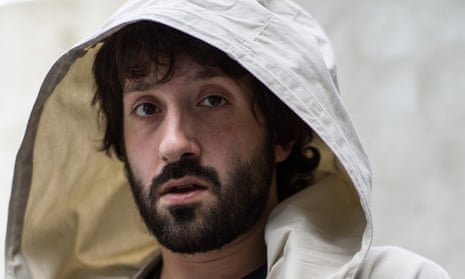Protest music takes many forms. In the late 80s, techno guerrillas Jeff Mills and “Mad” Mike Banks formed the musical collective Underground Resistance as a reaction to the economic and social struggles of Detroit’s black community. Their movement was part of a wider nexus of anti-establishment dance music culture sweeping the globe, later encompassing the UK’s rave scene.
The Guardian’s product and service reviews are independent and are in no way influenced by any advertiser or commercial initiative. We will earn a commission from the retailer if you buy something through an affiliate link. Learn more.
These days, electronic music’s political legacy is eclipsed by the dominant aesthetic of glossy EDM superclubs. However, Long Island-born DJ and producer Rizzla – aka Brian Friedberg – seeks to inject the spirit of dissent into his art. On 25 September, he releases his debut EP on the respected Los Angeles label Fade to Mind. “It’s the soundtrack to an uprising in its highs and really dirty lows,” says Friedberg of his track Iron Cages, the name of which is taken from social theorist Max Weber’s definition of capitalist bureaucracy.
Friedberg, who currently lives in New York, has been influenced by the time he spent studying in Trinidad, and his work is tied to the rhetoric of black cultural resistance: “People like CLR James, Marcus Garvey, Leonard Howell – the history of liberation in the Caribbean is all so important to what I do,” he explains. Sonically, his music is in thrall to Caribbean styles like soca, bubbling, hardstyle and dembow. The latter has origins in dancehall, so how does he reconcile the music’s inherent homophobia with his art?
“Lyrically, dancehall has changed dramatically over the last five to 10 years,” says Friedberg. “Jamaica had its first – albeit small – Pride this year, and the discourse in the whole of the Caribbean on LGBT rights is moving faster and faster. It’s exciting to see all this happening when a decade ago it would have been unthinkable.”
Rizzla’s EP is built around knife-edge pauses and jump-up beats, with desultory BPMs pitted against 90s house samples. There’s a track called Black Jacobins, referring to the Haitian revolution, and one called Fucking Fascist, an urgent grime dirge of sirens, dembow and eerie, disembodied vocals. “It’s the march down the streets to the plantation house or the capital the night where the revolution starts,” he says.
Friedberg is a member of the #KUNQ collective, alongside Battyjack, False Witness and others. As well as DJing at New York-based nights like Papi Juice and queer dancehall party Reggay, they work in creative practices which include visual arts or academia. “Basically we’re refugees from different parts of the LGBT spectrum who came together to create an aggressive safe space,” he says.
Rizzla enjoyed a year-long residency at Venus X and Shayne Oliver’s famed GHE20G0TH1K parties, also instrumental in creating a safe space for queer people of colour. “Venus was the first person to book me for a real party in NYC years ago and GHE20G0TH1K has always been our party model,” enthuses Friedberg.
Rizzla was discovered in Boston by Fade to Mind co-founder Kingdom – real name Ezra Rubin – and he was signed up to the label straight away. Like Underground Resistance, Friedberg rejects what he calls “modern corporatised culture” and says Fade to Mind is the label that matches the ideals and diversity of the radical underground most closely. Rubin and Will Boston (whose nom de disque is Prince William) have put out records by electronic artists like vogue/new ballroom mainstay MikeQ, and LA singer Kelela, whose 2013 mixtape Cut 4 Me propelled the label into the public consciousness. Since its release, Fade to Mind has scored residencies at art galleries and festivals alike.
Fade to Mind’s carefully chosen artists share a specific ethos. “We all approach music from a deeply personal and experimental stance,” says Rubin. “There’s violence and rage where other labels are trying to avoid that whole realm of human emotion.” It’s precisely this reaction to homogeneity within an increasingly click-conscious scene which marks the label out as such an exciting and subversive musical phenomenon.
For now, the GHE20G0TH1K parties may be on hiatus, but on the other side of the US, Fade to Mind seems like a natural continuation of their sensibility – albeit in a mutated form. Fade to Mind has been putting on parties in New York, including Rizzla’s record release party at experimental music venue Trans Pecos last month.
Friedberg gushes over his new home of New York: “I’m often woken up on the weekends by dembow/bachata/mambo mixtapes blaring outside my window in south Williamsburg. There’s an energy that gets inside you – a huge source of inspiration. It’s just the way NYC sounds on the street.”

Comments (…)
Sign in or create your Guardian account to join the discussion